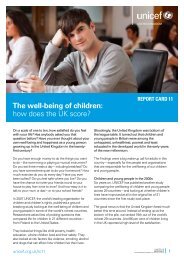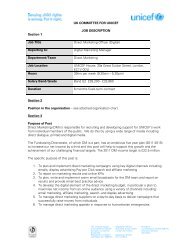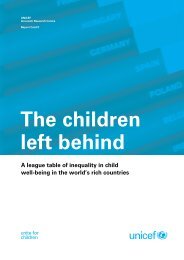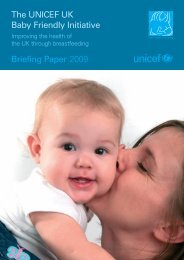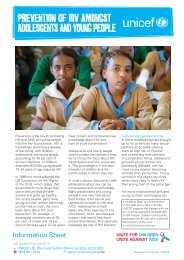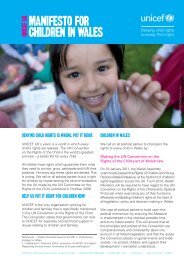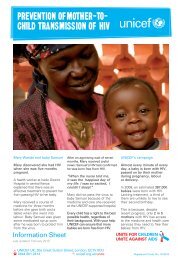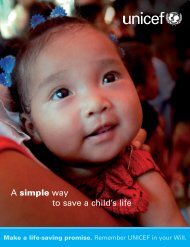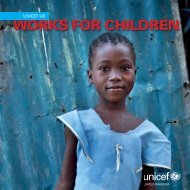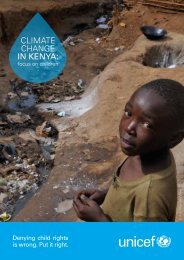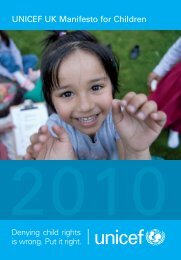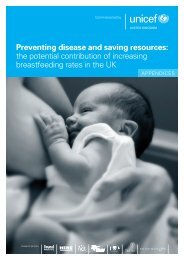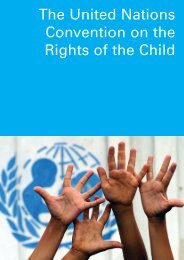UNICEF UK Trustees Report and Financial Statements 2010
UNICEF UK Trustees Report and Financial Statements 2010
UNICEF UK Trustees Report and Financial Statements 2010
You also want an ePaper? Increase the reach of your titles
YUMPU automatically turns print PDFs into web optimized ePapers that Google loves.
The United Kingdom Committee for <strong>UNICEF</strong><br />
<strong>Report</strong> of the <strong>Trustees</strong><br />
For the year ended 31 December <strong>2010</strong><br />
<strong>and</strong> sanitation often hit children <strong>and</strong> women the hardest, increasing their vulnerability<br />
to disease.<br />
Rainwater harvesting technology collects <strong>and</strong> stores water during the rainy season,<br />
providing a source of safe water at times of drought. We have also helped children<br />
learn safe hygiene <strong>and</strong> sanitation practices. Hygiene promotion at school creates<br />
conditions where children are agents of change in their families <strong>and</strong> communities,<br />
encouraging good practice in sanitation.<br />
Previous interventions have proved that the provision of safe water at school<br />
premises encourages the enrolment, retention <strong>and</strong> performance of children at<br />
school. The facilities benefit girls in particular, who often used to miss going to<br />
school because they had to travel large distances to collect water for their families.<br />
Climate change in Kenya<br />
<strong>UNICEF</strong> <strong>UK</strong>’s report Climate change in Kenya: focus on children brought climate<br />
models to life with stories from children on the impact of climate change in different<br />
regions of Kenya. It also provided examples of how <strong>UNICEF</strong> can support children in<br />
Kenya to adapt to <strong>and</strong> reduce the impact of climate change. The Brookings Institute,<br />
an influential Washington think-tank, cited the study in one of its reports.<br />
Climate ambassadors<br />
Two of <strong>UNICEF</strong> <strong>UK</strong>’s young Climate Ambassadors became founder members of the<br />
Department for Energy <strong>and</strong> Climate Change Youth Panel. Thanks to lobbying <strong>and</strong><br />
campaigning, child rights <strong>and</strong> the voice of young people were high on the <strong>UK</strong><br />
Government’s agenda at the <strong>2010</strong> UN Climate Change Conference at Cancun,<br />
Mexico. In December, with support from Energy <strong>and</strong> Climate Change Minister<br />
Charles Hendry the panel produced a groundbreaking report outlining their vision for<br />
a low carbon <strong>UK</strong>.<br />
<strong>UNICEF</strong> <strong>UK</strong> influenced the <strong>UK</strong> Government through lobbying, reports <strong>and</strong> work with<br />
young people to promote underst<strong>and</strong>ing <strong>and</strong> acceptance of the importance of intergenerational<br />
justice in addressing climate change (that is, the right of children/future<br />
generations to a clean environment). We ran successful events on climate change at<br />
all three main party conferences. At the Liberal Democrat conference, Paddy<br />
Ashdown, President of <strong>UNICEF</strong> <strong>UK</strong>, hosted a climate change reception with<br />
Secretary of State Chris Huhne, <strong>and</strong> one of our young climate ambassadors spoke<br />
on child rights <strong>and</strong> climate change at a fringe event.<br />
<strong>UNICEF</strong> <strong>UK</strong>’s carbon footprint<br />
Recognising our own responsibilities, <strong>UNICEF</strong> <strong>UK</strong> joined the 10:10 campaign <strong>and</strong> set<br />
ourselves the objective of reducing our carbon footprint by at least 30 per cent per<br />
staff member over the three years to the end of <strong>2010</strong>. In 2007, we were responsible<br />
for more than 1,981 tonnes of CO 2 emissions from our energy use, travel <strong>and</strong> paper<br />
consumption. This equated to 12.8 tonnes per full-time equivalent staff member. By<br />
the end of <strong>2010</strong>, we had reduced our carbon footprint to 1,441 tonnes, or 7.2 tonnes<br />
per staff member – a reduction of 44 per cent over the three years.<br />
We have achieved these reductions by implementing a policy <strong>and</strong> action plan to<br />
reduce our resource consumption, re-use <strong>and</strong> recycle as much waste as possible<br />
20



